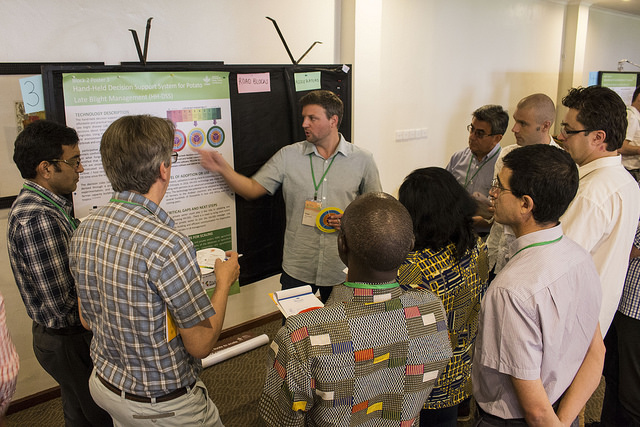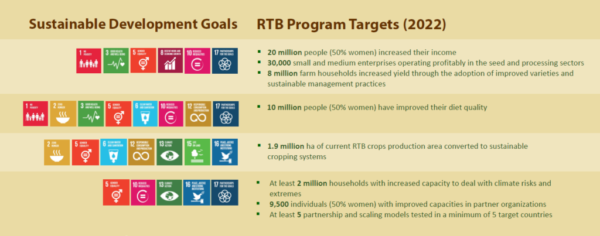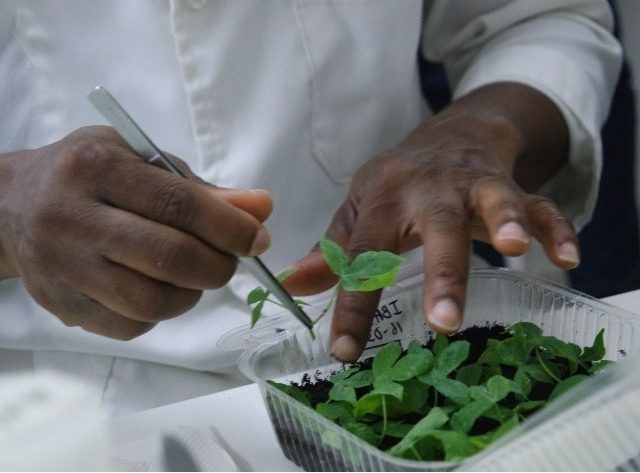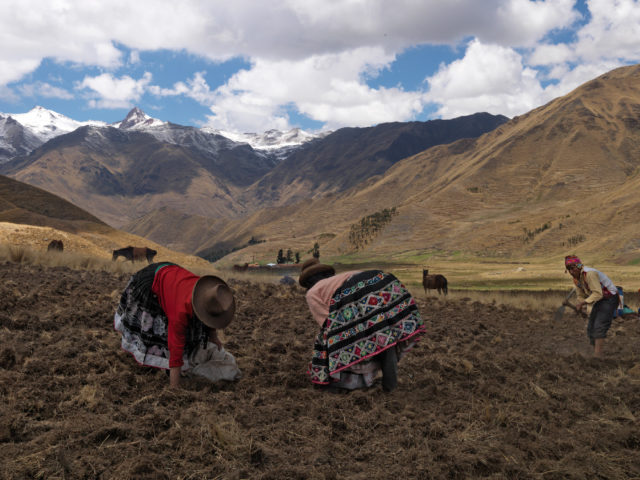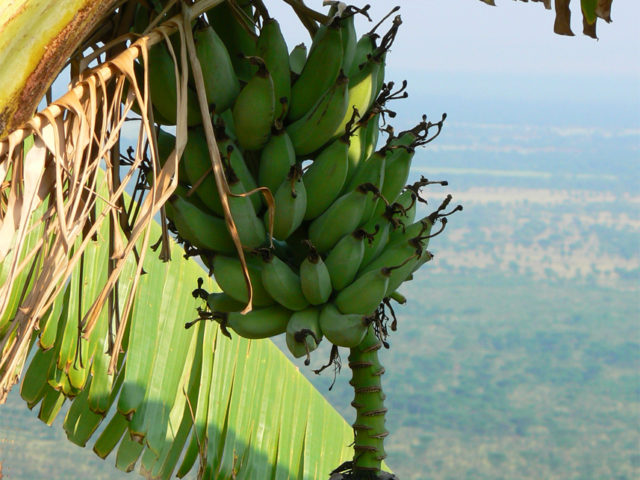The CGIAR Research Program on Roots, Tubers and Bananas (RTB) has ambitious targets to improve the lives of millions of men and women who depend on root, tuber and banana crops by 2022. Achieving those targets means focusing on the most promising technologies and innovations. And it means linking these innovations with the tools and approaches that can take them to scale.
As RTB commences its second phase, it is opportune to shine a spotlight on our approaches to scaling and how they enhance the innovations developed through the program that have the potential to be adopted by millions.
Towards this, RTB held a World Café style event on 10 March in Dar es Salaam, Tanzania, to match scalable technologies with approaches and tools for scaling, while increasing participants’ understanding of both the technologies and scaling approaches.
The event brought together researchers from across RTB’s five program participant centers – the International Potato Center (CIP), the International Institute of Tropical Agriculture (IITA), the International Center for Tropical Agriculture (CIAT), Bioversity International and Centre de Coopération Internationale en Recherche Agronomique pour le Développement (CIRAD) – along with donor representatives, Tanzanian national partners, and other partners including Wageningen University and the Natural Resources Institute.
‘Scalable technologies’ are innovations that have resulted from RTB research and which are either already adopted by farmers or other users, or will be adopted over the next three years. Additionally, the technology must have – or will have – a large number of beneficiaries. An outstanding example of a scalable technology is the orange fleshed sweetpotato for health and nutrition improvement, already adopted by over 2 million households, for which three CIP scientists were awarded the prestigious World Food Prize in 2016.
During the World Café, participants circulated among posters of their choice in small group discussions, rotating every 15 minutes and sharing their thoughts on what might be the ‘roadblocks’ or ‘accelerators’ to scaling for each innovation.
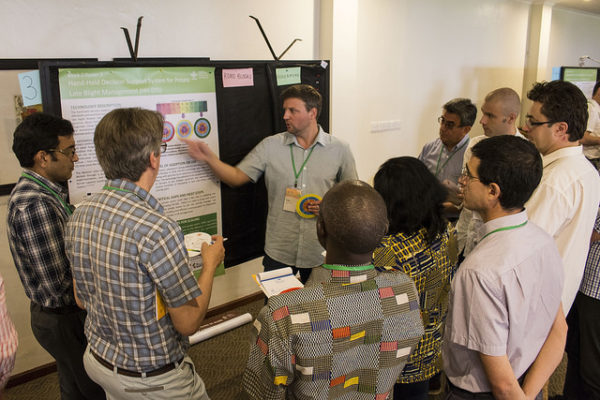
Participants rotated to a new poster every 15 mins. Each poster could have a maximum of 10 visitors at any one time to encourage effective conversations. Photo H.Holmes/RTB
Posters were divided in the three categories throughout the day: 1) scalable technologies for varieties and seed, 2) scalable technologies for resilient cropping, postharvest and nutrition and sustainable intensification, and 3) approaches and tools for scaling, innovation and enhancing gender relevance.
“The ‘speed-dating’ between RTB’s natural and social scientists led to new ideas on how to further improve the scaling of RTB innovations,” reflects Dr. Marc Schut, IITA Social Scientist and leader of RTB’s Flagship Project 5 on Improved Livelihoods at Scale.
During the event, several scientists commented that the exercise had changed their perceptions of the complexity of the science surrounding scaling and what the process entails, along with a greater awareness of the importance of considering scaling from the outset of a project.
Likewise, social scientists working on scaling of innovations also shared that the small-group discussions led to ideas of how the approaches to scaling could be tailored to better suit certain technologies.
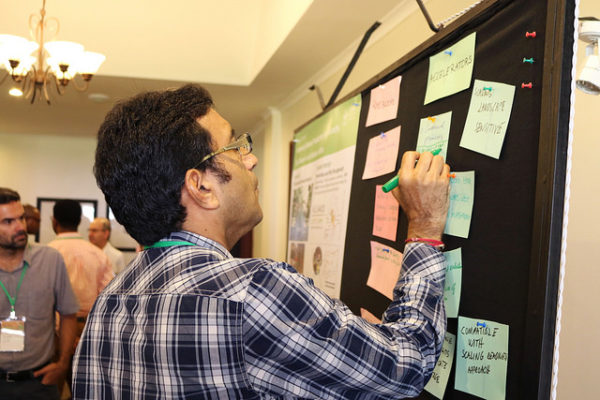
Participants shared factors that could act as ‘roadblocks’ and ‘accelerators’ to the scaling of technologies presented in categories 1 and 2. Photo H.Holmes/RTB
For Juma Kayeke, an agronomist from the Tanzanian Agricultural Research Institute (TARI) based in the region of Mbeya, the workshop provided exposure to new technologies and approaches, and the chance to further connect with partners.
“It was so valuable to interact with people from different backgrounds, specializations, research areas and crops… In the tools and approaches for scaling category, I was particularly interested in the decision support tools, because sometimes when we are talking with farmers and extension officers they get very bound to what they should do at specific times in the farming cycle. If they could have a support tool to enable make decisions about what actions to take at what times, that would be a big breakthrough,” he added.
One technology that stood out on the day to Schut was the AdiosMacho pesticide developed by CIP, which attracts and kills male potato tuber moth species, reducing the population of the pest.
“The scaling of RTB innovations requires focused strategies and human and financial resource investments, and this was clearly shown in the AdiosMacho technology. AdiosMacho evolved from a research product towards a commercial product, and together with the public and private sector roadblocks have been systematically addressing. We need to learn from these cases to accelerate the scaling of other RTB innovations,” he explained.
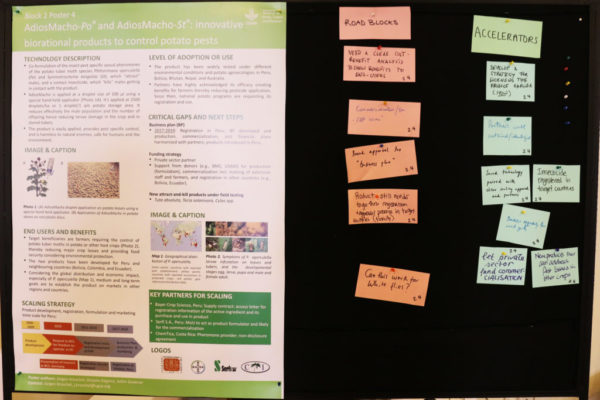
Examples of ‘roadblocks’ and ‘accelerators’ to scaling of the AdiosMacho technology presented in the poster.
RTB’s Flagship Project 5 will build on the World Café with a repository of scalable RTB innovations, and seek to accelerate scaling, by sharing tools and approaches with projects and scientists in the other RTB Flagships, for sustainable development impacts.
Posters of scalable technologies and of tools and approaches for scaling are available for download from the event page.
